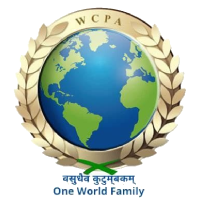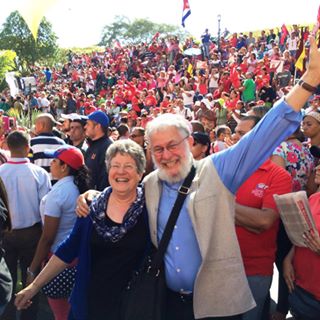Social Democracy In Venezuela
Glen T. Martin
Photo by Glen T. Martin
The Bolivarian Revolution is alive and well in Venezuela. Having just returned from nine days in the epicenter of the Bolivarian Revolution, I would like to describe some of what I learned in meetings with government and judicial officials and with a number of leaders of the thriving Venezuela cooperative movement. The phrase “Bolivarian Revolution” means a living affirmation of democracy, socialism, patriotism, independence, and anti-imperialism.
These concepts integrate together in the excitement of a revolutionary vision of solidarity and hope. The extraordinary constitution for Venezuela, introduced in 1999 when Hugo Chavez was first elected President, is called “Bolivarian,” and the government since that time calls itself “Goberieno Bolivariano de Venezuela.” The constitution affirms a “legal order” based on the “superior values” of “life, liberty, justice, equality, solidarity, democracy, social responsibility…human rights, ethics, and political pluralism” (Article 2).
The democratic socialist government under President Chavez (and continuing under President Maduro since Chavez’s passing in 2013) affirms at least four programs that have many wealthy Venezuelans and North American neo-liberal capitalists seeing red: (1) food programs for all who need: no hungry, (2) housing programs for all who need: no homeless, (3) free education for all who need: no illiteracy, (4) free healthcare for all who need: no unnecessary illness and death. Unlike Cuba (which I have visited 6 times), where the government itself enforces these things to the exclusion of political pluralism, Venezuela has set itself the noble and monumental task of achieving a truly democratic socialism that embraces political pluralism.
Simon Bolivar (1783-1830), whose name has become a symbol of the struggle for independence from imperialism in Latin America, was a great anti-colonial military leader and visionary who was inspired by the democratic revolutions in France and the United States. He led forces that defeated the Spanish dominators, and he played a key role in establishing Columbia, Bolivia, Ecuador, Peru, and Venezuela as sovereign states. Everywhere in Venezuela today he is linked with Hugo Chavez as the two central visionaries behind the Bolivarian Revolution.
On the wall of one government building in Caracas is a quote from Bolivar’s 1829 letters: “Los Estados Unidos parecen destinados por la Providencia para plagar al America de miserias a nombre de la libertad” (the United States seems destined by providence to plague America with misery in the name of freedom). A prophetic statement indeed. As historian Greg Grandin chronicles in Empire’s Workshop, since the Monroe doctrine of 1823 the U.S. has consciously dominated and exploited Latin America with a range of vicious neo-colonial forms of imperialism.
As the US based movement called School of Americas Watch points out, in the past several decades one key element of this has been the training of Latin American military forces in the “counter-insurgency warfare” techniques of torture, assassinations, and forced disappearances. During the 1970s and 80s, the US helped coordinate the infamous “Operation Condor” in which right wing governments around Latin America systematically implemented these brutal terrorist methods against left-wing activists and spokespersons. These facts underline the Bolivarian revolutionary theme of patriotism, independence, and anti-imperialism.
In Caracas we visited a former military prison now preserved as a museum. The two gentlemen who gave us a private tour had both been incarcerated there for many years. The museum includes lists of the disappeared and assassinated under previous US supported right wing Venezuelan governments, and it helps us understand the ringing affirmation in the Venezuelan Constitution in which all public authorities, including the military, “even during a state of emergency” are “prohibited from effecting, permitting or tolerating the forced disappearance of persons” and are required “not to obey” any order to carry out such an act (Article 45).
The museum also powerfully links together the struggle for Latin American liberation in country after country. It honors Ché Guevara from Argentina, Camilo Cienfuegos from Cuba, Salvador Allende from Chile, Augusto Sandino from Nicaragua, Farabundo Martí from El Salvador, Jacobo Arbenz from Guatemala, Emiliano Zapata from Mexico and many others. And it links the struggle against imperialism to the resistance in Iraq with photographs of the US forms of torture in the Abu Ghraib prison in Bagdad and elsewhere. In December 2014, President Obama issued an “emergency” Executive Order that identified Venezuela as a “threat” to human rights and to the United States, citing the actions of some of Venezuela’s leaders.
The dripping irony here that strikes the Venezuelans, as it does all politically aware persons, is apparently lost on the one-dimensional imperial robots and pundits of US exceptionalism—as the US executes by assassination teams or remote-control drones people suspected of resisting its imperial juggernauts in countries across the world. Realizing the possible significance of Obama’s declaration (the “threat to human rights” has been used as a cover to destroy the independent governments of Libya and many other countries), President Maduro called this “the most aggressive, unjust and poisonous step that the U.S. has ever taken against Venezuela.”
The patriotism and anti-imperialism of the Bolivarian Government of Venezuela is a tool, perhaps a necessary one at this point in history, in the struggle against imperialism. But I made the point to the people I spoke with that the emphasis on patriotic loyalty to national sovereignty is a losing proposition in the long run. The imperial forces love the fact that the world is divided into some 193, mostly militarized, independent sovereign territories. They invade Vietnam and who dares to stop them? They overthrow the democratically elected governments of Guatemala (1953) and Chile (1973), and who comes to the aid of these victimized countries? They destroy Afghanistan, Iraq, Syria, and Libya with relative impunity.
Despite its stirring patriotism and wonderful commitment to justice and socialism, Venezuela taken as a “threat” is in grave danger. The government has collected evidence that the US has been funneling money to dissident groups within Venezuela to attack government buildings, threaten people’s security, disrupt transportation, and destabilize the country. The only real solution for all “sovereign nations” is to join together under an Earth Federation with the authority and strength to put an end to planetary imperialism by the global centers of capitalist wealth and planetary exploitation. If only 10 or 15 nations in the “global periphery” were to join together under the Constitution for the Federation of Earth, open to all who wish to be part of the “Earth Federation,” the world would reach a fundamental turning point toward universal democracy, justice, equality, and freedom.
Victimized nations in Latin America, Africa, and Asia would be begging to join the emerging Earth Federation as a way out of the trap of poverty and domination. Patriotism and the rhetoric of sovereignty may help peripheral nations struggle resolutely against the imperial drive for “full spectrum dominance” over every corner of the planet in the service of this global system of domination and exploitation, but the dominators use precisely this fragmented system to divide and conquer, destabilizing and recolonizing one country after another with relative impunity. It often begins with a declaration such as “Venezuela is a threat.”
The way out of this world system that we inherit from early-modern fragmented thinking is to make the paradigmshift to holism. Holism is the new paradigm discovered by all the sciences during the 20th century: human beings are one, civilization is one, the ecological interdependence of all life on Earth is one. Why are we not then politically and economically one? I elucidate this concept in some detail in my newest book One World Renaissance: Holistic Planetary Transformation through a Global Social Contract.
Why do we continue with this absurd fragmentation of human civilization within absolute militarized territorial boundaries? Most of the values of the Venezuelan revolution are universal: equality, justice, freedom, dignity, peace, sustainability, and democratic socialism. Universal values need a universal constitution to establish and protect a decent world system for all humanity. The Earth Constitution, widely available in many languages both in print and on the internet, lays out a practical and comprehensive way for the vast majority of human beings to take charge of their planet from the 1% who now dominate nearly everything. The Earth Constitution provides all the democratic socialist rights and freedoms specified in the Venezuelan Constitution.
But it also offers us the only practical and credible way to establish freedom for all human beings: a freedom that includes peace and environmental sustainability for our endangered planet. Many Venezuelans that I met were very interested, including many in the PROUT network of spiritual-economic cooperatives flourishing in that country. Just as their own Bolivarian Constitution poses an ideal of just and free governance for Venezuela, they told me, so the world needs an ideal of where we should be headed and of what kind of world system we need to be working toward. That ideal is presented to humanity in a concrete form through the Constitution for the Federation of Earth. Let us activate in ourselves a new patriotism: an intense loyalty to our precious planet Earth and to all human beings everywhere.


